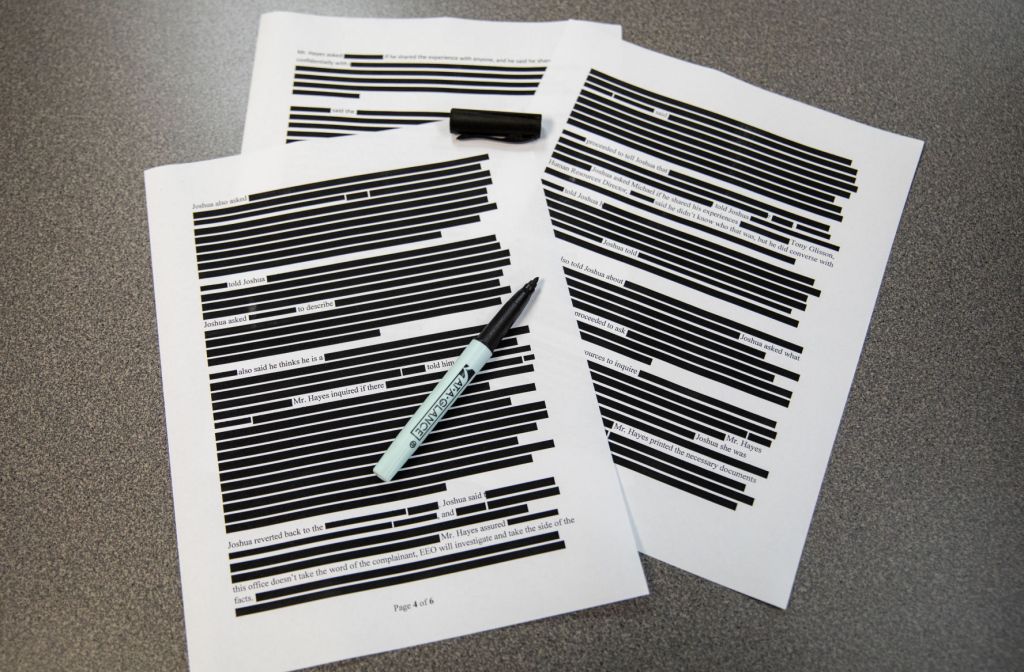WKU failing when it comes to transparency
Published 12:15 am Sunday, June 20, 2021

- The heavily-redacted WKU Title IX sexual misconduct records are shown after being obtained by the Bowling Green Daily News via an Open Records Request. (Photo illustration by Grace Ramey/photo@bgdailynews.com)
Last week, we published a report about hundreds of pages of newly released – though heavily redacted – records that documented sexual harassment committed by Western Kentucky University employees.
Buried within more than 1,800 pages of censored documents are numerous instances of misconduct. The reports are alarming: A faculty member threatened to place a registration hold on a student’s TopNet account if she did not go to dinner with him. A campus administrator openly sexually harassed male students and bullied the women he was responsible for supervising. These are only a couple examples we gleaned from these heavily blacked-out Title IX records.
Often, the employees in question were allowed to leave their jobs or retire without fanfare.
In some cases, employees who knew about the misconduct perpetrated against students failed to report it – even after students complained openly and repeatedly.
These employees were allowed to undergo more training, even though all campus employees are “responsible employees,” as designated under the federal anti-sex discrimination law, Title IX. Every WKU employee is required to report incidents of misconduct and harassment to the university’s Title IX coordinator or designee.
The redacted records are available on our website, along with the initial story.
Reading through these records, one can learn quite a lot about how WKU handles sexual misconduct and harassment investigations – even though the university’s heavy-handed redactions obscure the basic details of many investigations.
The dates of internal memos – and even the names of the campus officials who conducted the investigation – are obscured in many instances. These omissions are entirely outside the bounds of the names and personal identifiers of the students and employees who brought the complaints – those should be withheld to protect those courageous enough to come forward.
In the days that followed the publication of our report, we heard not a peep from WKU. At our request, the university finally issued a statement on the matter on Wednesday:
“The release by WKU of more than 1,800 pages of Title IX case investigation documents shows none of the cases involved allegations of criminal activity by WKU faculty or staff. The (College Heights) Herald and the Bowling Green Daily News requested investigation documents covering a five-year period. A total of 18 files were released, of which six individual employees were found to have violated WKU policy. In all instances where the investigation found policy violations, the respondent employee’s employment ended. The documents provided to the Herald and the Bowling Green Daily News were redacted by WKU’s attorneys, following guidance from FERPA and from a 2021 ruling issued by the Kentucky Supreme Court in a similar case between the University of Kentucky and the Kentucky Kernel. The purpose of redaction is preventing the disclosure of information that could allow a reasonable person in the community to identify the complainant (victim) or witnesses. The extent of redaction necessary depends on the unique circumstances of each case. WKU remains committed to providing a safe educational and work environment with prompt, effective and equitable processes for responding to and resolving complaints.”
The wording of the statement reveals much about the university’s foremost priority in this matter: self-preservation.
It should be no secret that instances of employee sexual harassment and misconduct often go unreported, primarily because victims fear retaliation or that investigators won’t take their complaints seriously enough. It is a fear that is, unfortunately, well-founded.
Given that fact, is it reasonable to conclude that many more instances of misconduct were never reported to WKU’s Title IX division? We think so.
Further, it’s worth noting that these are only five years’ worth of investigations; they only cover a relatively small snapshot of time.
Additionally, if there is a desire for transparency, why has the university fought for years in court against its own student newspaper to keep the records out of the public eye?
The university’s attorneys can redact students’ names and personal identifiers, as these records clearly show. So why is it that we’re only seeing these records now?
The university’s official response reads like it was forwarded directly from its legal team, which continues to defend WKU in a yearslong lawsuit it brought after the College Heights Herald requested these records in November 2016.
We asked the Herald’s attorney, Michael Abate, for comment addressing the university’s statement. It follows verbatim:
“From the beginning, it was clear that WKU had no right to withhold the records. That is why virtually every other university in the state complied with the requests, with minimal redactions. Years into this case, WKU finally released some records. But once again they are misstating the law to serve their own overriding purpose: secrecy. Their heavy-handed redactions ignore decades of case law and attorney general opinions making clear what the public has the right to know. Simply put, WKU thinks it knows best what the public should ‘get’ to see. That is the legislature’s job, and they said we get everything (aside from the students name). We will keep litigating this case until we have all the information we are entitled to receive.”
We agree with Abate’s stance, and we call upon the university to live up to the virtues it regularly champions – shared governance and transparency.
Despite how badly WKU wants all of this to be swept under the carpet, it’s pretty clear that isn’t happening any time soon.


